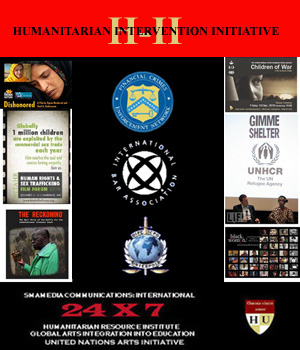Four years after the 2008 financial crisis,
banks are behaving more recklessly than ever. - Too
Big to Fail and Too Risky to Exist: The American
Scholar, Autumn 2012.
-------------------------------------------
30 August 2012
Contact:
Stephen M. Apatow
Founder,
Director of Research & Development
Humanitarian
Resource Institute (UN:NGO:DESA)
Humanitarian University
Consortium Graduate Studies
Center
for Medicine, Veterinary Medicine & Law
Phone:
203-668-0282
Email:
s.m.apatow@humanitarian.net
Internet:
www.humanitarian.net
International
Disaster Information Network
Url:
www.humanitarian.net/idin

U.S.
Presidential Candidates Focus on Solutions to the Financial Crisis
As the race to the
Whitehouse picks up steam, the U.S. Presidential
Candidates Focus on Solutions to the Financial Crisis. The Academy Award
winning documentary,
"The Inside Job" spotlights challenges during the 1999-2008 period, and
the global economic crisis that
continues to spiral out of control. [1]
The Timeline:
- Party like it's 1999.
- Year 2000 Conversion (Y2K) presents
a technology challenge that could shut down the infrastructure of every
UN member country. [2]
- Y2K viewed as a one time global central bank
coordinated liquidity
infusion to assist remediation, supporting 193 UN member countries.[3]
- Global strategic plan focuses on exploitation
of liquidity.
- Repeal of 1999 Glass-Steagall, separates
commercial and
investment banking, established in 1933 following post 1929 Market
Crash (1929-33 Reserve bank driven boom period fueled by combined
commercial and investment banks). [4]
- Reserve bank funds transition into financial
markets and proprietary trading.
- 2000 Commodity Futures Modernization Act
deregulates OTC derivatives. [5,6]
- Global markets rally.
- Tech Bubble and Crash follow 911 shock.
- Housing market (Financial crimes focus on
predatory lending, mortgage and appraisal fraud) [7] used to drive
recovery, CDS, CDO debt instruments exploited through unregulated OTC
derivatives market. [8]
- Unregulated shadow banking system expands to
$1.4 Quadrillion in 2006. [9]
- Global Financial markets collapse in 2008,
focus transitions to
emergency actions to address financial crimes in unregulated markets
(2000-2008).
- Emergency regulatory actions shut down,
emergency reserve bank funds transition back into markets (Zero
Interest Rate Policy).
- Global distortions and hyperinflation
continues to spiral the global financial system into a deeper crisis.
[10]
- Countries remain in technical insolvency,
emergency actions viewed once again as a vehicle for leverage by
investment banks.
- Political and lobbying efforts shut down
emergency efforts
separate commercial and investment banks (the #1 priority following the
2008 Global Market Crash, combined with restructure).
- Damage caused by unregulated OTC derivatives
market and shadow
banking system (2000-2008) can only to be addressed through a 193
country global strategic plan for restructure and debt relief. [11]
- Objective viewed as a political impossibility,
outside another market crisis or crisis responsive scenario.
- 2012 Efforts continue to target the root
causes of the financial crisis.
References:
- Inside
Job - Prosecution for Financial Crimes Top Priority - FINCEN -
Interpol - IBA: HRI-ICC: HRI:UNArts Humanitarian
Intervention Initiative, 19 April 2011.
Url:
http://www.unarts.org/H-II/ref/4192011OHCHR.html
- Year 2000
Conversion: Global Infrastructure Analysis &
Contingency Planning: Humanitarian Resource Institute. Url:
http://www.humanitarian.net/contingency.html
- Public
Provision of Private Liquidity Prior to the Millennium
Date Change: Federal Reserve Bank of New York, 23 September 2005.
Url:
http://www.newyorkfed.org/research/conference/2005/liquidity/Sundaresan_Wang.pdf
- FDIC:
The Great Depression: 1929-1939:
Url:http://www.fdic.gov/about/learn/learning/when/1930s.html
- Commodity
Futures Modernization Act H. R. 5660: Commodity Futures Trading
Commission (CFTC). Url:
http://www.cftc.gov/ucm/groups/public/@lrrulesandstatutoryauthority/documents/file/ogchr5660.pdf
- 2000
Commodities Act Paved Way For Problems: NPR, 20 March 2009.
Url: http://www.npr.org/templates/story/story.php?storyId=102185942
- Financial Crimes to the Public: FBI 2005 Report -
Mortgage
Fraud. Url:
http://www.fbi.gov/publications/financial/fcs_report052005/fcs_report052005.htm#d1
- IOSCO
- Unregulated Financial Markets and Products:Consultation report
from the International Organization of Securities Commissions (IOSCO),
May 2009 . Url:
http://www.scribd.com/doc/47208358/IOSCO-Unregulated-Financial-Markets-and-Products
- Remarks
by Jill Considine: At the joint European Central Bank/Federal Reserve
Bank of Chicago Conference on “Issues Related to Central Counterparty
Clearing” Frankfurt, Germany, April 4, 2006. Url:
http://www.ecb.int/events/pdf/conferences/ccp/Considine.pdf
- Y2K=QE2:
Charts, Safe Haven. Url: http://www.safehaven.com/article/20661/y2kqe2
- H-II Appeal to International Bar Association - Tools
for Restructure: HRI:UNArts Humanitarian Intervention Initiative,
26 May 2011. Url: www.unarts.org/H-II/ref/5262011IBAHRI.html
IDIN
Discussions
UN
Economic Emergency
###
|